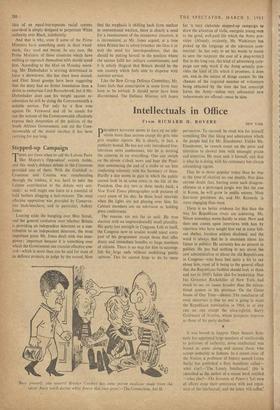Stepped-up Campaign
MIIERE are times when to call the Labour Party 1 'Her Majesty's Opposition' sounds risible, and this week's defence debate in the Commons provided one of them. With the Gaitskell v. Crossman and Cousins war reverberating through the lobbies, it was hard to take the Labour contribution to the debate very seri- ously: as well might one listen to a roomful of bald barbers plugging a hair-restorer. The most effective opposition was provided by Conserva- tive back-bcnchers; and in particular, Aubrey J ones.
Leaving aside the bungling over Blue Streak, and the general confusion over whether Britain is providing an independent deterrent or a con- tribution to an independent deterrent, the most important point Mr. Jones dealt with was man- power: important because it is something over which the Government can exercise effective con- trol---which is more than can be said for most of its defence projects, to judge by the record. Now 'Sore yourself, you sinners! Brother Cowboy has some potent medicine made from the rarest, finest witch doctor while flower that ever grew.'---The Connection, Act II. that the emphasis is shifting back from nuclear to conventional warfare, there is clearly a need for a reassessment of the manpower situation; it is inconsistent, as Mr. Jones argued, at a time when Britain has to admit (whether she likes it or not) the need for interdependence, that she should be putting herself in the position where she cannot fulfil her military commitments; and it is utterly illogical that Britain should be the one country which feels able to dispense with national service.
Like the Bow Group Defence Committee, Mr. Jones feels that conscription in some form may have to be revived. It should never have been discontinued. The Defence Minister still hopes for 'a very elaborate stepped-up campaign to draw the attention of virile, energetic young men to the good, well-paid life which the Army pro- vides (Already, evidently, Mr. Watkinson has picked up the language of the television com- mercial: he has only to set his words to music to save the taxpayer the cost of a plug-writer.) But in the long run, this kind of advertising cam- paign can only work if the Army actually pro- vides the kind of life which it promises; it does not, and in the nature of things cannot. So the chances of the required number of volunteers being obtained by the time the last conscript leaves the Army—unless very substantial new inducements are offered—must be slim.






































 Previous page
Previous page